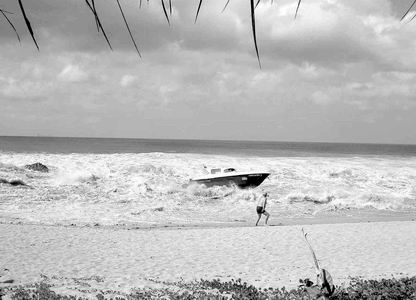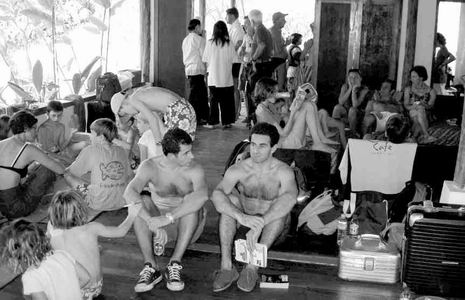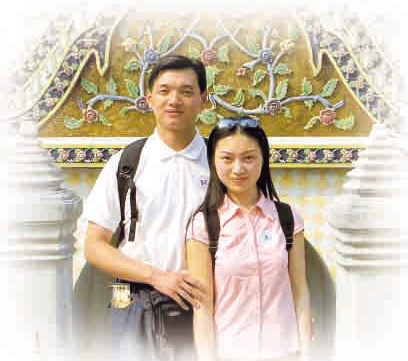Shanghai Daily reporter, Zhang Jun, provides first-hand
account.

A speedboat is turned over while a man is shocked by
huge waves along the beach in Sri Lanta, a resort on Lanta Island in southern
Thailand near the town of Krabi on December 26.(Photo:Zhang Jun)

Besieged vacationists wait for rescue in a big pavilion
at the highest part of a mountain in the resort.(Photo:Zhang Jun)

Zhang Jun and his wife
It was supposed to be a romantic honeymoon on a beautiful beach resort in
Thailand, but it ended up as an unexpected adventure that left me fearing for my
life and my wife's for the better part of 24 hours.
After spending all of
November deciding where to spend our honeymoon, my wife and I decided to spend
five days in Sri Lanta - a resort on Lanta Island in southern Thailand near the
town of Krabi.
We checked into the resort around midnight on Christmas Day
and prepared for several relaxing days on the beach.
However, right after we
had our breakfast at a little past 10am, Sri Lanta's normally peaceful beach
along the Andaman Sea was thrown into chaos by three giant tidal waves that
smashed into the island within a 20-minute stretch.
When the first two waves
hit the edge of the resort, turning over one speedboat on the beach, the more
than 20 vacationists enjoying a little sun and sand were completely shocked. At
that point, many of us just assumed it was a normal phenomenon of the
sea.
But the last wave, which looked six to eight meters high, wiped out most
of the straw-and-wood pavilions and injured many resort employees and guests,
making it instantly clear we were facing a severe natural catastrophe.
My
wife and I were among those who first noticed the danger of the waves and ran as
fast as we could away from the beach on sandals, shouting "Run,
Run!"
Unfortunately, many of our companions, overwhelmingly people from
western countries including France, Britain and the United States, were rolled
into the wave as they didn't react quickly enough.
The Sri Lanta resort is
divided by a road that separates a relaxation and restaurant area near the beach
from the 49 bungalows built along the slope of a mountain.
After the three
waves, no one dared to walk into the beach area of the resort except the young
employees of Sri Lanta who risked their lives to retrieve passports and other
important items that were caught in the surf.
As the waves had cut phone
lines and the resort didn't have any TVs, we were still in the dark about what
had happened when a resort manager gave us the good news that none of the guests
or employees had been seriously hurt or killed by the waves.
Later, he
explained to us Phuket and Phi Phi islands were in total chaos as the result of
the waves, which were caused by a strong earthquake. He also mentioned the
possibility of new tidal waves in the following hours which would be "more
destructive."
At that point, the bungalows' 50 guests were restricted to a
big pavilion at the higher part of the mountain. My wife, Zhang Yi, and I were
the only two from China's mainland.
Later on, many Sri Lanta employees, some
of whom had received injuries to their heads and legs, rescued the resort's
storage of drinking water, fruits and vegetables from the danger area and
carried them into the pavilion for our use.
We stayed in the pavilion for
more than five hours - past sunset - as we were still afraid more destructive
waves could hit at any time.
By 5pm we were able to take short showers and
one phone line was fixed so we could try to make calls home to our worried
relatives.
When night fell, we were given a small flashlight to find our way
around.
My wife and I decided to move back to our bungalow to try to get some
sleep. But we were all awakened at around 12:30am by the manager who called us
to sleep at the top of the mountain for safety reasons, saying that a very
destructive tidal wave could come at any time.
That was one of the most
difficult times of my life as we didn't know if another wave would hit, when it
would arrive or how powerful it might be.
Everyone on the island was told to
sleep out in the open at the top of the mountain, a warning the coast guard
repeated through the nearby forests and mountains.
Under the dark sky, we
slept shoulder to should under beach towels that had to pass for blankets.
At
6am, we were finally told it was safe to return to out bungalows.
The next
morning, December 27, we and hundreds of other tourists staying on Lanta Island
were relocated to nearby Krabi Province.
After my wife and I were finally
settled at the Crystal Hotel in Krabi, we were still horrified by the scenes we
had witnessed 24 hours earlier.
In addition to fear, I also felt admiration
for the humanity of the Sri Lanta employees and the many foreigners who
registered as volunteers to help the wounded at Krabi Hospital.
With dozens
of overhead helicopters still searching for survivors in Krabi, Phuket and Phi
Phi islands, we felt that we were the "most lucky of the unlucky people in the
world."



